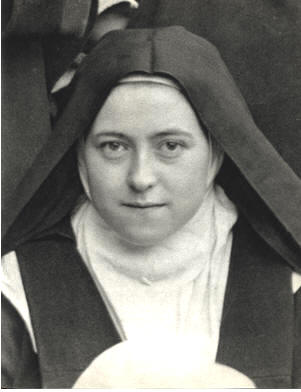 St Therese of Lisieux
St Therese of Lisieux
Doctor of the Church
![]() The Unknown Saint Therese
The Unknown Saint Therese ![]() Victim of Love
Victim of Love ![]() Act of Oblation
Act of Oblation![]() Suffering and humility
Suffering and humility![]() Communion of saints / Intercession
Communion of saints / Intercession![]() Saint Therese love for priests
Saint Therese love for priests![]() Novena
Novena
Websites:
Thoughts of St. Therese
archives-carmel-lisieux - Photos
thereseoflisieux.org
Catholic.org
Catholic Culture![]() Book: I believe in Love by Fr. Jean C. J. d'Elbée. Publisher: Sophia Institute Press.
Book: I believe in Love by Fr. Jean C. J. d'Elbée. Publisher: Sophia Institute Press.
For St. Thérèse, to be a religious meant to be the bride of Jesus and mother of souls (cf. Ms B, 2v)... She became a Carmelite, "to save souls and to pray for priests". Full text: St Therese by Benedict XVI
Her heart was so full of love for God that she could not contain her desire to give herself to Him. She wrote:
"My longing for martyrdom was powerful and unsettling" Not only did she want to be a warrior and die in the battlefield defending the Church but she also wanted to be a priest, apostle, and a doctor of the Church; she wanted to preach the Gospel to the four continents. "‘Jesus, Jesus’—she wrote —‘if I were to write all my desires, I would have to borrow Thy book of life; I wanted to have achieved all these deeds for Thee". Then she understood that all those vocations hinge on love for love is an unquenchable fire and she decided: "In the Heart of the Church I will be love"
Love Crucified Community is called to the same love. To be victims of love means to have the same fire in our hearts.
Receive the Blood
Looking at a picture of Our Lord on the Cross, I was struck by the Blood flowing from His Hands. I felt great sadness when I realized that this Blood was falling to the ground without anyone rushingto gather it up. I resolved to remain in spirit at the foot of the Cross to receive it, and pour it out upon souls" - St. Therese of Lisieux.
In the heart of the church I will be love
St Thérèse’s autobiography
excerpt taken from Divine Office, Oct 1
Since my longing for martyrdom was powerful and unsettling, I turned to the epistles of St. Paul in the hope of finally finding an answer. By chance the 12th and 13th chapters of the 1st epistle to the Corinthians caught my attention, and in the first section I read that not everyone can be an apostle, prophet or teacher, that the Church is composed of a variety of members, and that the eye cannot be the hand. Even with such an answer revealed before me, I was not satisfied and did not find peace.
I persevered in the reading and did not let my mind wander until I found this encouraging theme: Set your desires on the greater gifts. And I will show you the way which surpasses all others. For the Apostle insists that the greater gifts are nothing at all without love and that this same love is surely the best path leading directly to God. At length I had found peace of mind.
When I had looked upon the mystical body of the Church, I recognized myself in none of the members which St. Paul described, and what is more, I desired to distinguish myself more favourably within the whole body. Love appeared to me to be the hinge for my vocation. Indeed I knew that the Church had a body composed of various members, but in this body the necessary and more noble member was not lacking; I knew that the Church had a heart and that such a heart appeared to be aflame with love. I knew that one love drove the members of the Church to action, that if this love were extinguished, the apostles would have proclaimed the Gospel no longer, the martyrs would have shed their blood no more. I saw and realized that love sets off the bounds of all vocations, that love is everything, that this same love embraces every time and every place. In one word, that love is everlasting.
Then, nearly ecstatic with the supreme joy in my soul, I proclaimed: O Jesus, my love, at last I have found my calling: my call is love. Certainly I have found my place in the Church, and you gave me that very place, my God. In the heart of the Church, my mother, I will be love, and thus I will be all things, as my desire finds its direction.